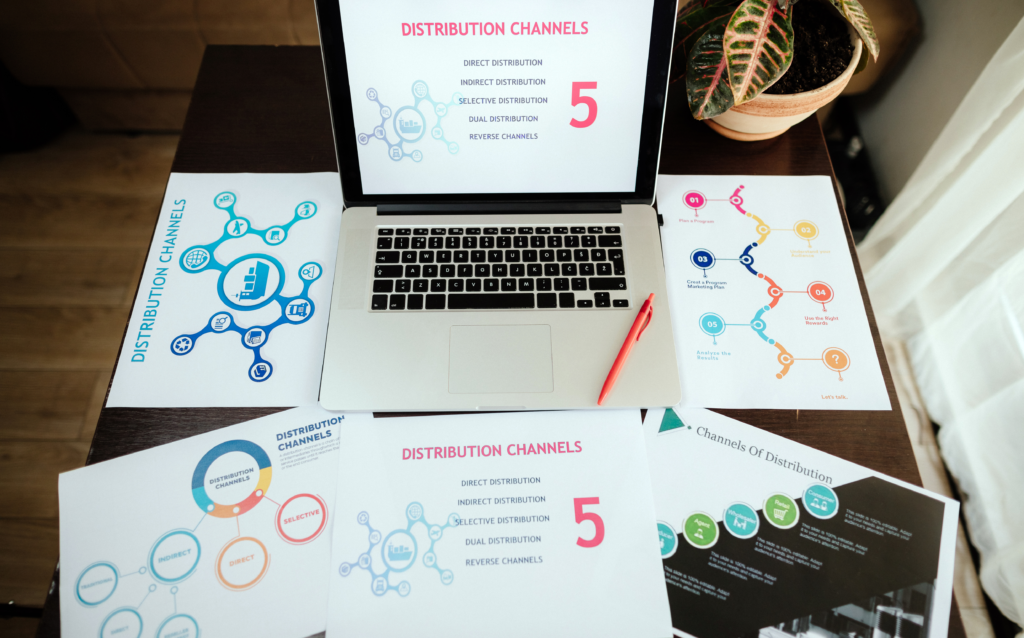In today’s digital age, characterized by rapid technological advancements and dynamic shifts in consumer behavior, businesses face the imperative to evolve their marketing strategies continually. Within this landscape, digital marketing channels have emerged as indispensable tools for effectively reaching and engaging target audiences. This comprehensive guide aims to delve into the multifaceted realm of digital marketing channels, exploring their definition, significance, diverse types, strategic applications, and the challenges they entail.
The Evolution of Marketing Channels
Understanding the evolution of marketing channels provides valuable context for grasping the significance of digital marketing. Traditional channels such as print, television, radio, and direct mail once reigned supreme in the advertising domain. However, with the advent of the internet and the proliferation of digital technologies, a seismic shift occurred in the marketing landscape. The rise of digital platforms fundamentally transformed how businesses connect with consumers, leading to unprecedented opportunities and challenges.
What Are Digital Marketing Channels?
Digital marketing channels encompass an extensive array of online platforms and techniques utilized by businesses to promote their products or services, engage with their target audience, and drive desired actions. Unlike traditional marketing channels, digital platforms leverage the vast reach and interactive capabilities of the internet and electronic devices to deliver targeted marketing messages directly to consumers. From search engines to social media platforms, email campaigns to influencer collaborations, digital channels offer diverse avenues for brands to connect with their audience in meaningful ways.
Importance of Digital Marketing Channels
In today’s hyper-connected global landscape, digital marketing channels offer several distinct advantages over their traditional counterparts:
- Enhanced Targeting: Digital channels empower marketers to execute precise audience targeting strategies based on demographic data, consumer interests, online behavior, and other granular parameters. This precision enables brands to deliver tailored messages to specific audience segments, maximizing relevance and engagement.
- Cost-Effectiveness: Digital marketing often boasts a superior return on investment (ROI) compared to traditional channels, primarily due to lower entry costs and more efficient targeting mechanisms. Moreover, the ability to track and measure campaign performance in real-time allows marketers to optimize spending and allocate resources strategically, ensuring optimal outcomes within budget constraints.
- Global Reach: One of the most transformative aspects of digital marketing is its capacity to transcend geographical barriers and connect businesses with a global audience instantaneously. Through digital channels, brands can engage with consumers across continents, fostering international brand awareness, and driving cross-border sales opportunities.
- Real-Time Analytics: Digital marketing provides marketers with invaluable insights into campaign performance through real-time analytics. By leveraging sophisticated tracking tools and analytics platforms, marketers can monitor key performance indicators (KPIs), measure campaign effectiveness, and gain actionable insights into consumer behavior. This data-driven approach enables agile decision-making, allowing marketers to refine strategies on the fly and optimize campaign performance iteratively.
In essence, digital marketing channels have become indispensable assets for businesses seeking to navigate the complexities of the modern marketing landscape. By harnessing the power of digital platforms, brands can unlock new levels of precision, efficiency, and effectiveness in their marketing endeavors, driving sustainable growth and competitive advantage in an increasingly digital world.
Types of Digital Marketing Channels
Digital marketing encompasses a diverse array of channels and tactics, each tailored to serve specific purposes and engage audiences through various mediums. Understanding the distinct characteristics and strategic applications of these channels is essential for crafting effective marketing campaigns and maximizing audience reach and engagement. Let’s delve deeper into each of the prominent digital marketing channels:
1. Search Engine Optimization (SEO):
Search Engine Optimization (SEO) is a cornerstone of digital marketing, focusing on optimizing a website’s content and structure to enhance its visibility in search engine results pages (SERPs) and drive organic traffic. By employing strategic keyword research, on-page optimization, link building, and technical SEO techniques, businesses can improve their search engine rankings and attract qualified traffic from users actively searching for relevant products or services.
2. Pay-Per-Click Advertising (PPC):
Pay-Per-Click Advertising (PPC) enables businesses to display targeted ads on search engines and other digital platforms and pay only when users click on their ads. PPC campaigns are highly customizable, allowing advertisers to set specific budget limits, target audience demographics, geographical locations, and keywords. Platforms like Google Ads and Bing Ads offer robust PPC advertising solutions, enabling businesses to drive targeted traffic, increase brand visibility, and achieve measurable results.
3. Social Media Marketing (SMM):
Social Media Marketing (SMM) leverages popular social media platforms such as Facebook, Instagram, Twitter, LinkedIn, and Pinterest to connect with audiences, build brand awareness, and drive engagement. SMM encompasses a wide range of tactics, including organic content posting, paid advertising, influencer collaborations, and community engagement. By creating compelling content, fostering authentic interactions, and leveraging targeting capabilities, businesses can cultivate loyal communities, amplify brand messaging, and drive meaningful interactions with their target audience.
4. Content Marketing:
Content Marketing revolves around creating and distributing valuable, relevant content to attract and retain a target audience and drive profitable customer action. Content marketing encompasses various formats, including blog posts, articles, videos, infographics, e-books, podcasts, and more. By delivering informative, entertaining, and engaging content that addresses audience needs and interests, businesses can establish authority, build trust, and nurture relationships with their target audience, ultimately driving conversions and fostering long-term customer loyalty.
5. Email Marketing:
Email Marketing remains a highly effective channel for nurturing leads, building relationships, and driving conversions. Email marketing involves sending targeted promotional messages, newsletters, or automated email sequences to a list of subscribers. By segmenting audiences, personalizing content, and employing strategic automation workflows, businesses can deliver relevant messages at the right time, driving engagement, and driving desired actions such as purchases, sign-ups, or downloads.
6. Affiliate Marketing:
Affiliate Marketing entails partnering with other businesses or individuals (affiliates) who promote products or services in exchange for a commission on sales generated through their referrals. Affiliate marketing programs typically involve providing affiliates with unique tracking links or promo codes to track their referrals’ sales. By leveraging the reach and influence of affiliates, businesses can expand their audience reach, drive sales, and achieve mutually beneficial partnerships with affiliate partners.
7. Influencer Marketing:
Influencer Marketing harnesses the influence of individuals with large followings on social media platforms to promote products or services to their audience. Influencer marketing campaigns can range from sponsored content collaborations to ambassadorships and product endorsements. By partnering with influencers whose values, audience demographics, and content align with their brand, businesses can leverage influencers’ credibility and reach to amplify brand messaging, drive engagement, and generate authentic connections with their target audience.
8. Mobile Marketing:
Mobile Marketing focuses on reaching audiences on their mobile devices through channels such as mobile apps, SMS marketing, and mobile-optimized websites. With the proliferation of smartphones and mobile devices, mobile marketing presents significant opportunities for businesses to engage with consumers on the go, deliver location-based promotions, and provide seamless mobile experiences. From mobile-responsive website design to targeted mobile app advertising, businesses can leverage mobile marketing to connect with audiences in meaningful ways and drive conversions in the increasingly mobile-centric landscape.
Each digital marketing channel offers unique capabilities and strategic advantages for businesses seeking to connect with their target audience, drive engagement, and achieve marketing objectives. By integrating a diverse mix of digital marketing channels into their overall marketing strategy and adapting their approach to evolving consumer behaviors and preferences, businesses can maximize their reach, optimize their marketing efforts, and drive sustainable growth in the digital age.
Strategies for Effective Digital Marketing Channel Management
To leverage the full potential of digital marketing channels and drive meaningful results, businesses must employ strategic approaches tailored to their objectives, target audience, and industry landscape. Here are elaborate strategies for effective digital marketing channel management:
1. Set Clear Objectives:
Defining specific, measurable goals for each digital marketing channel is crucial for guiding strategy and measuring success. Whether the objective is to increase website traffic, generate leads, boost sales, or enhance brand awareness, clear objectives provide a roadmap for planning and execution. By establishing Key Performance Indicators (KPIs) aligned with business goals, marketers can track progress, evaluate performance, and optimize campaigns for maximum impact.
2. Understand Your Audience:
In-depth understanding of the target audience is essential for crafting compelling messaging and content that resonate with their needs, preferences, and pain points. Conducting thorough market research, analyzing demographic data, and leveraging customer insights enable marketers to create buyer personas and develop targeted communication strategies. By segmenting audiences based on behavior, interests, and psychographics, businesses can deliver personalized experiences that drive engagement and foster brand loyalty.
3. Choose the Right Channels:
Selecting the most appropriate digital marketing channels based on objectives, target audience characteristics, and industry dynamics is critical for optimizing resource allocation and maximizing impact. Whether it’s Search Engine Optimization (SEO), Pay-Per-Click Advertising (PPC), Social Media Marketing (SMM), or Email Marketing, each channel offers unique strengths and advantages. By understanding channel-specific capabilities and audience preferences, marketers can identify the channels that best align with their goals and allocate resources effectively for optimal results.
4. Consistent Branding:
Maintaining a consistent brand identity across all digital marketing channels is essential for building trust, credibility, and recognition among the target audience. Consistent branding encompasses elements such as logo, color palette, messaging tone, and visual style, ensuring a cohesive brand experience across touchpoints. By adhering to brand guidelines and standards, businesses can reinforce brand values, differentiate themselves from competitors, and create a memorable impression that resonates with consumers.
5. Test and Iterate:
Continuous monitoring, testing, and optimization are fundamental principles of effective digital marketing channel management. By analyzing campaign performance, experimenting with different strategies and tactics, and measuring results, marketers can identify what works best for their audience and refine their approach accordingly. A/B testing, multivariate testing, and performance analytics provide valuable insights into audience preferences, campaign effectiveness, and areas for improvement, enabling marketers to iterate and optimize campaigns for maximum impact and ROI.
6. Stay Updated:
Staying abreast of the latest trends, technologies, and best practices in digital marketing is essential for maintaining competitiveness and relevance in the rapidly evolving landscape. With the digital marketing landscape constantly evolving, marketers must remain vigilant and adaptable to emerging trends, consumer behaviors, and technological advancements. Engaging in continuous learning, attending industry conferences, and networking with peers enable marketers to stay informed, inspired, and equipped with the knowledge and skills needed to navigate the ever-changing digital marketing landscape effectively.
Effective digital marketing channel management requires a strategic approach encompassing clear objectives, audience understanding, channel selection, consistent branding, continuous testing, and staying updated with industry trends. By adopting these strategies and principles, businesses can optimize their digital marketing efforts, drive meaningful engagement with their target audience, and achieve sustainable growth in today’s competitive marketplace.
Challenges and Opportunities in Digital Marketing Channels
While digital marketing channels offer numerous advantages for businesses seeking to reach and engage with their target audience, they also present a set of challenges that marketers must navigate strategically. Understanding these challenges and opportunities is crucial for developing effective digital marketing strategies that drive meaningful results. Let’s delve into the challenges and opportunities inherent in digital marketing channels:
1. Information Overload:
The proliferation of digital channels and content has led to a saturation of information, resulting in a phenomenon known as information overload. In this highly competitive digital landscape, businesses face the challenge of cutting through the noise and capturing the attention of their target audience amidst a sea of competing messages. To overcome this challenge, marketers must focus on creating high-quality, relevant content that adds value to the audience’s lives, resonates with their interests, and addresses their pain points.
Opportunity: By delivering compelling, informative, and engaging content, businesses can differentiate themselves from competitors, establish thought leadership, and build trust with their audience. Leveraging storytelling, multimedia content formats, and interactive experiences can capture attention, drive engagement, and foster meaningful connections with consumers.
2. Fragmented Audience:
Audiences today are spread across multiple digital channels and devices, making it increasingly challenging for marketers to reach and engage with them effectively. With consumers accessing content through smartphones, tablets, laptops, and smart TVs, marketers must adapt their strategies to deliver seamless, omni-channel experiences that cater to diverse audience preferences and behaviors.
Opportunity: The fragmented nature of the digital landscape presents an opportunity for businesses to diversify their marketing efforts and engage with audiences across multiple touchpoints. By leveraging data-driven insights and advanced targeting capabilities, marketers can identify the most relevant channels and platforms for reaching their target audience and tailor their messaging accordingly. Adopting an omni-channel approach enables businesses to create cohesive brand experiences that resonate with consumers across their digital journey.
3. Privacy Concerns:
Data privacy regulations and consumer concerns about privacy pose significant challenges for digital marketers in collecting and using customer data responsibly. With stringent regulations such as the General Data Protection Regulation (GDPR) and the California Consumer Privacy Act (CCPA) in place, businesses must adhere to strict compliance requirements when collecting, storing, and processing personal data.
Opportunity: Embracing transparency, accountability, and ethical data practices can help businesses build trust and credibility with their audience. By obtaining explicit consent, providing clear privacy policies, and implementing robust data security measures, marketers can reassure consumers that their privacy rights are respected. Moreover, prioritizing data protection and privacy can foster stronger customer relationships, as consumers are more likely to engage with brands they perceive as trustworthy and respectful of their privacy.
4. Ad Fraud and Click Fraud:
Digital advertising is susceptible to ad fraud and click fraud, wherein fraudulent actors artificially inflate ad impressions or clicks to deceive advertisers and siphon ad spend. Ad fraud undermines the effectiveness of digital advertising campaigns, resulting in wasted resources, diminished ROI, and damage to brand reputation.
Opportunity: Leveraging advanced ad verification tools, fraud detection algorithms, and ad fraud prevention technologies can help businesses mitigate the risk of ad fraud and safeguard their advertising investments. By partnering with reputable ad networks and platforms that prioritize transparency and accountability, marketers can minimize exposure to fraudulent activities and maximize the impact of their digital advertising campaigns. Additionally, focusing on performance metrics such as conversion rates, engagement metrics, and return on ad spend (ROAS) can provide insights into campaign effectiveness and help identify and address anomalies indicative of fraudulent activity.
While digital marketing channels present a myriad of challenges, they also offer significant opportunities for businesses to differentiate themselves, innovate, and deliver personalized, targeted experiences that resonate with their audience. By addressing challenges proactively, embracing emerging technologies, and prioritizing customer-centric strategies, businesses can unlock the full potential of digital marketing channels and drive sustainable growth in today’s competitive marketplace.
Conclusion
In the dynamic landscape of today’s digital age, digital marketing channels have become indispensable tools for businesses to connect with their target audience. By leveraging diverse digital channels like SEO, SMM, email marketing, and content marketing, businesses can transcend traditional boundaries, crafting compelling narratives and fostering authentic connections with their audience. However, success in digital marketing goes beyond channel utilization; it requires a commitment to continuous optimization, adaptation, and innovation. Businesses must remain agile and responsive to changing trends, harnessing comprehensive market research and consumer insights to deliver personalized experiences that resonate with their audience’s needs and preferences. Embracing emerging technologies and a culture of experimentation will empower businesses to stay ahead of the curve and drive tangible results in the ever-evolving digital landscape.
In conclusion, digital marketing channels have revolutionized the way businesses engage and interact with their audience, offering unprecedented opportunities for brand visibility and meaningful engagement. However, achieving success in digital marketing demands a relentless pursuit of improvement, fueled by consumer-centricity, innovation, and adaptability. As businesses navigate the complexities of the digital landscape, those who embrace agility, creativity, and data-driven strategies will emerge as leaders, driving growth and differentiation in the dynamic world of digital marketing.
FAQ’s
What are digital marketing channels?
Digital marketing channels encompass various online platforms and tactics that businesses use to promote their products or services, connect with their target audience, and drive desired actions. These channels leverage the internet and electronic devices to deliver marketing messages to consumers.
What types of digital marketing channels are available?
Some prominent types of digital marketing channels include Search Engine Optimization (SEO), Pay-Per-Click Advertising (PPC), Social Media Marketing (SMM), Content Marketing, Email Marketing, Affiliate Marketing, Influencer Marketing, and Mobile Marketing.
Why are digital marketing channels important?
Digital marketing channels offer several advantages over traditional channels, including enhanced targeting, cost-effectiveness, global reach, and real-time analytics. These channels enable businesses to reach a wider audience, engage with consumers on a more personal level, and achieve measurable results.
How can businesses effectively manage digital marketing channels?
Effective management of digital marketing channels requires setting clear objectives, understanding the target audience, selecting the right channels, maintaining consistent branding, testing and iterating strategies, and staying updated on industry trends and best practices.
What challenges do businesses face in digital marketing channels?
Challenges in digital marketing channels include information overload, fragmented audience across multiple devices, privacy concerns regarding data collection, and the risk of ad fraud and click fraud. These challenges require businesses to innovate and adopt strategies to overcome them.
What opportunities do digital marketing channels present?
Despite challenges, digital marketing channels offer opportunities for businesses to differentiate themselves, innovate, and deliver personalized experiences that resonate with their audience. By embracing emerging technologies and consumer-centric strategies, businesses can unlock new avenues for growth and success.












